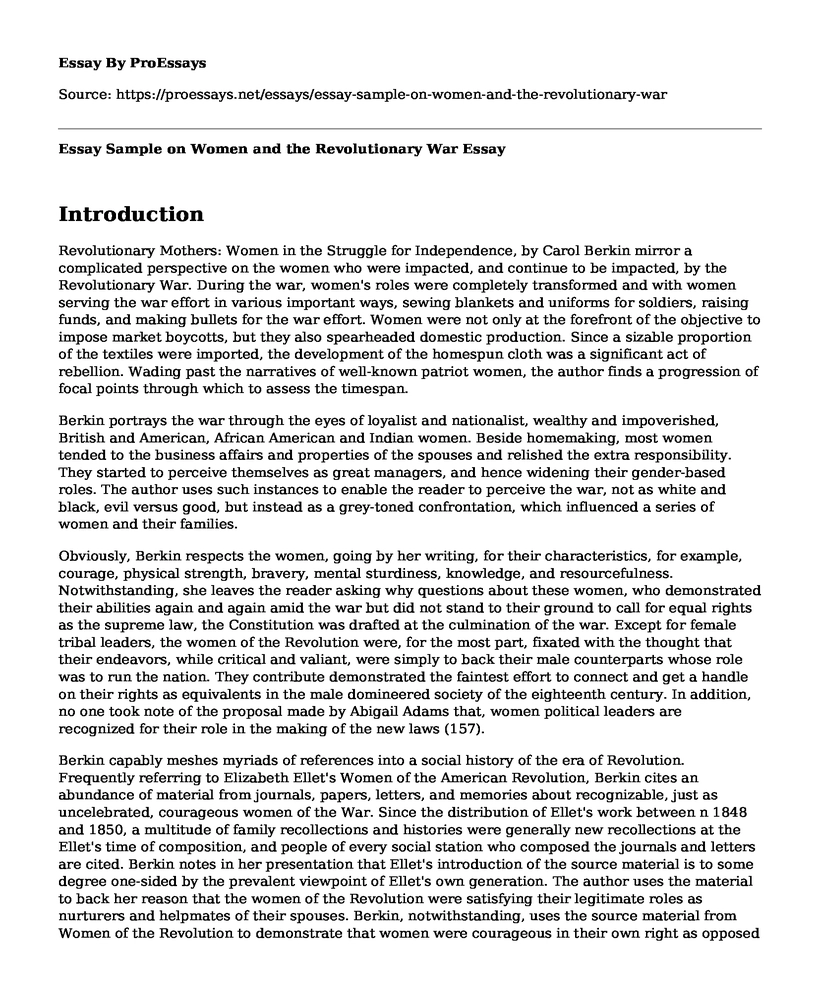Introduction
Revolutionary Mothers: Women in the Struggle for Independence, by Carol Berkin mirror a complicated perspective on the women who were impacted, and continue to be impacted, by the Revolutionary War. During the war, women's roles were completely transformed and with women serving the war effort in various important ways, sewing blankets and uniforms for soldiers, raising funds, and making bullets for the war effort. Women were not only at the forefront of the objective to impose market boycotts, but they also spearheaded domestic production. Since a sizable proportion of the textiles were imported, the development of the homespun cloth was a significant act of rebellion. Wading past the narratives of well-known patriot women, the author finds a progression of focal points through which to assess the timespan.
Berkin portrays the war through the eyes of loyalist and nationalist, wealthy and impoverished, British and American, African American and Indian women. Beside homemaking, most women tended to the business affairs and properties of the spouses and relished the extra responsibility. They started to perceive themselves as great managers, and hence widening their gender-based roles. The author uses such instances to enable the reader to perceive the war, not as white and black, evil versus good, but instead as a grey-toned confrontation, which influenced a series of women and their families.
Obviously, Berkin respects the women, going by her writing, for their characteristics, for example, courage, physical strength, bravery, mental sturdiness, knowledge, and resourcefulness. Notwithstanding, she leaves the reader asking why questions about these women, who demonstrated their abilities again and again amid the war but did not stand to their ground to call for equal rights as the supreme law, the Constitution was drafted at the culmination of the war. Except for female tribal leaders, the women of the Revolution were, for the most part, fixated with the thought that their endeavors, while critical and valiant, were simply to back their male counterparts whose role was to run the nation. They contribute demonstrated the faintest effort to connect and get a handle on their rights as equivalents in the male domineered society of the eighteenth century. In addition, no one took note of the proposal made by Abigail Adams that, women political leaders are recognized for their role in the making of the new laws (157).
Berkin capably meshes myriads of references into a social history of the era of Revolution. Frequently referring to Elizabeth Ellet's Women of the American Revolution, Berkin cites an abundance of material from journals, papers, letters, and memories about recognizable, just as uncelebrated, courageous women of the War. Since the distribution of Ellet's work between n 1848 and 1850, a multitude of family recollections and histories were generally new recollections at the Ellet's time of composition, and people of every social station who composed the journals and letters are cited. Berkin notes in her presentation that Ellet's introduction of the source material is to some degree one-sided by the prevalent viewpoint of Ellet's own generation. The author uses the material to back her reason that the women of the Revolution were satisfying their legitimate roles as nurturers and helpmates of their spouses. Berkin, notwithstanding, uses the source material from Women of the Revolution to demonstrate that women were courageous in their own right as opposed to simply in their allocated womanly roles.
Berkin, notwithstanding the Ellet work, makes great use of the primary source material, citing from such records as the Edenton Resolves, mandates from the American command, and The Book of Negroes, and the Philipsburg Proclamation. These sources assist readers to comprehend the thought processes of women and their motivations for supporting either the Americans or the British. Perusing the Edenton Resolves, we comprehend why the women of North Carolina boycotted British merchandise, and we perceive the action plan. The drivers of the Negro women escape to British war camps are increasingly clear when the writer cites from the Philipsburg Proclamation, which asserted that any Negro who will betray the Rebel Standard would receive full security (125). Berkin encourages the reader to see the human side of the group. The scholar endeavors to show cause for the women's actions.
Work Cited
Berkin, Carol. Revolutionary Mothers: Women in the Struggle for Independence. New York: Alfred A. Knopf, 2005.
Cite this page
Essay Sample on Women and the Revolutionary War. (2022, Nov 27). Retrieved from https://proessays.net/essays/essay-sample-on-women-and-the-revolutionary-war
If you are the original author of this essay and no longer wish to have it published on the ProEssays website, please click below to request its removal:
- Essay Sample on Influence of Female Autonomy on the Indian Society
- Research Paper on Substance Abuse and SUD in Psychiatry
- Alcoholics Anonymous and Twelvestep Recovery Essay Example
- Tim & Courtney's Journey to Recovery: Impact of Self-Help Groups - Essay Sample
- Sexual Harassment: Unwanted, Intimidating, Unfair - Essay Sample
- Essay Example on Immigrants: Struggling to Survive in a Foreign Land
- Essay Example on Police Brutality: A Call for Reforms in the US







